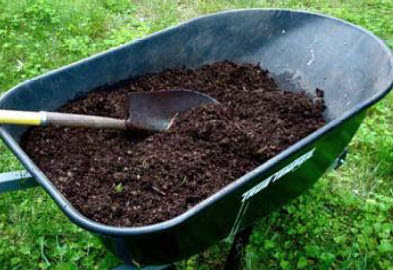How Does Compost Protect Water?
— Or Why Compost?

If compost is in any way mystical, it is because of the magic it works on soils. What other ingredient can increase water retention of heavy clay soils and slow water down as it passes through sandy soils?Compost can help degrade chemicals so that they do not reach the water supply. In addition, the beneficial organisms and organic matter in compost also make nutrients more available to plants – and healthy plants and soils use water more efficiently. By encouraging composting, the water utility can simultaneously address water pollution, water conservation, storm water runoff, solid waste management, and green house gas production.
Adding compost to flower beds and as top-dressing for lawns increases the ability of soil to hold water by increasing soil porosity and organic matter. Increased water retention of compost then reduces the need for supplemental watering and decreases the amount of storm-water runoff. Retaining water also reduces soil erosion, maintaining soil quality and keeping storm drains clear.
Because good compost builds healthy plants and soil, it also reduces the need for fertilizer, insecticides, and herbicides that ultimately find their way back into groundwater. Lawns annually top-dressed with compost are more resistant to both disease and drought.
Average household garbage is often composed predominately of recyclable material.
After plastic, glass, and metal fractions are removed, residential waste is primarily organics such as paper, lawn and garden trimmings, and food waste. The number of yard refuse bags left curbside each week is an amazing sight in many neighborhoods. Yet, this trash is actually valuable organic material that can be safely and economically reclaimed on site through composting. Best of all, it can be used to tame the biggest water consumers – lawns and gardens.